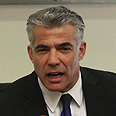

"Lapid advised his ministry's senior officials he intends to wage a belligerent policy to preserve the natural treasures of the State of Israel and said: 'The State of Israel's natural resources are a public asset and the Israeli public should benefit from them,'" Lapid's spokeswoman said in a statement.
Video courtesy of jn1.tv
Lapid decided to set up a public committee to re-examine the state's rights to natural resources managed by private companies, the statement added.
ICL welcomes public committee
A senior ICL source told Ynet that the company "welcomes the establishment of the committee, which will surely find that the extent of royalties paid by ICL to the State, at a rate of 35% of its earnings, is among the highest in the world in the field of potash sales.
"This rate is even expected to grow in the future to 45% of the company's earnings, following the latest agreement with the Finance Ministry."
The leaders of the ICL factories committee said in response, "We welcome Finance Minister Yair Lapid and Social Services Minister Meir Cohen's strong objection to the deal, which could have led to an economic disaster in the Negev, to the transfer of production to the Jordanian side of the Dead Sea, to the dismissal of thousands of workers, to the driving profits abroad and to harming each and every citizen in Israel.
"We would like to thank the Knesset members, the social organizations and the wide public for their support. The battle isn't over yet and we won't keep silent until the Knesset passes a law forbidding the sale of the Dead Sea to foreigners.
"The natural resources belong to Israel's citizens and should remain that way for eternity."
'Phosphate reserves drying up'
Meanwhile, Israel Chemicals' new chief executive Stefan Borgas warned Israel's phosphate reserves are drying up and called on the government to grant the company licenses to mine at a new site in the southern Negev desert.
Borgas, who took over as CEO of ICL last year, said the fertilizer producer's phosphate activities at Rotem, in the Negev, are among the highest-cost operations in the world.
"To become competitive we must reduce operating costs and increase volume significantly," Borgas said at a ceremony marking 20 years of trade in shares of ICL.
The only new reserves that can be mined economically are in Sde Barir, near the town of Arad, whose residents are strongly opposed to new mining activities fearing health repercussions.
"By allowing us to mine phosphates in Sde Barir, we will invest hundreds of millions of dollars and will be able to secure reserves for around 30 years," Borgas said. "But if we do not receive the licenses, it means that we will have to stop our Israeli phosphate activities within 10 years."
ICL, the second-largest company by market value on the Tel Aviv exchange, is controlled by conglomerate Israel Corp .
Borgas defended ICL in the wake of a campaign by some politicians to increase the amount ICL and other natural resource companies pay the government in royalties.
ICL pays over NIS 1 billion ($275 million) a year in taxes and royalties, or 35% of its domestic profits, and will in future pay even more due to changes in tax policies, Borgas said.
"We expect the government take to reach 45%, which is the highest government take paid by any fertilizer or chemical company in the world," he said.
Israel Corp CEO Nir Gilad said since Israel's January election there were no talks between Potash and the government, which must approve any acquisition.
Ester Levanon, CEO of the Tel Aviv Stock Exchange, expressed concern that the acquisition of all of ICL by a foreign company, and the delisting of its shares, would hurt Israel.
She estimated ICL accounts for about 20% of Israel's weighting in the MSCI global index and backed a partial merger allowing each company to continue to trade in its home market.
"It's a viable solution ... and if Potash would like to merge with Israel Chemicals that's the way it should be," Levanon told Reuters.















